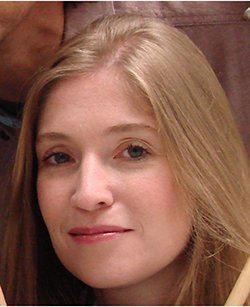Daniela Schiller
2010 Regional Award Winner — Post-Doc

Current Position:
Assistant Professor, Departments of Psychiatry and Neuroscience
Institution:
Friedman Brain Institute, Icahn School of Medicine at Mount Sinai (Previously at New York University)
Discipline:
Neuroscience
Recognized for: Demonstrating that a non-invasive, behavioral intervention, when timed to coincide with the re-storage of a fear memory, may actually permanently alter fear.
Areas of Research Interest and Expertise: Cognitive neuroscience, emotional learning and memory, reconsolidation of fear memories
Biography:
PhD, Psychobiology, Tel Aviv University
BA, Psychology and Philosophy, Tel Aviv University
Daniela Schiller’s research combines insights from animal models with the study of human brain function to develop groundbreaking techniques for controlling fear. Although learning to fear environmental and social cues that predict potential danger is important, it is equally important that fear is flexible. A lack of flexibility of fear can result in the maladaptive fear responses that characterize anxiety disorders. Through her work, Dr. Schiller and her team have shown how the human brain alters its representation of fear with new learning and additional information.
Since receiving the Blavatnik Award Dr. Schiller has established her own research laboratory for affective neuroscience where she continued exploring techniques for changing memories by targeting a phase of memory called ‘reconsolidation’. At the time of receiving the Award, Dr. Schiller and her colleagues have found a non-invasive way to target old fear memories in humans using reconsolidation. In the past four years, together with her team, Dr. Schiller has been investigating the neural mechanisms of the reconsolidation process in the human brain; testing novel pharmacological compound that might affect reconsolidation of fear memories, and developing behavioral techniques for modulating learned emotional reactions. In addition, she has expanded her investigation into the clinical population, examining ways to modify emotional memories in patients with anxiety and traumatic memories, such as in post-traumatic stress disorder (PTSD).
"The long-term goal of my research is to identify the neural processes that allow for memory modification in the human brain in order to alleviate traumatic memories."
Key Publications:
- Tavares R, William C, Grossman Y, Mendelsohn A, Shapiro M, Trope Y, and Schiller D. A map for social navigation in the human brain. Neuron. 2015
- Mendelsohn A, Pine A, and Schiller D. Between Thoughts and Actions: Motivationally salient cues invigorate mental action in the human brain. Neuron. 2014
- Schiller D, Kanen JW, LeDoux JE, Monfils MH, Phelps EA. Extinction during reconsolidation of threat memory diminishes prefrontal cortex involvement. Proceedings of the National Academy of Sciences. October 30, 2013
- Schiller D, Monfils M, Raio CM, Johnson D, LeDoux JE, Phelps EA. Blocking the return of fear in humans using reconsolidation update mechanisms. Nature. 2010
- Schiller D, Freeman JB, Mitchell JP, Uleman JS, Phelps EA. A neural mechanism of first impressions. Nat Neuroscience. April 12, 2009
Other Honors:
2014 Klingenstein-Simons Foundation Fellowship award in Neuroscience
In the Media:
Partial Recall. The New Yorker. May 19, 2014
Repairing Bad Memories. MIT Technology Review. June 17, 2013
Studio 360 Live: Daniela Schiller on Memory. January 17, 2013
the SCHILLER laboratory
